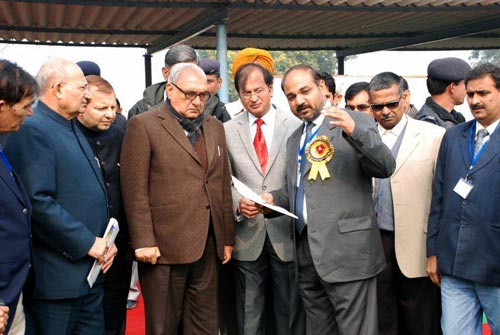 Thanks to high-yielding cultivars of wheat and rice, development of irrigation infrastructure, the work of innovative farmers, and the state’s support for improved technologies, the Indian state of Haryana has been a major contributor to the national food basket. However, the unsustainable monotonous rice-wheat cropping system increasingly threatens food security in the country. On 22 December 2012, a seminar on “Prosperity through diversification in agriculture” was jointly organized by the Haryana Farmers Commission, Indian Council of Agricultural Research (ICAR), National Dairy Research Institute (NDRI), Government of Haryana’s (GoH) Department of Agriculture, CIMMYT, Protection of Plant Varieties and Farmers’ Right Authority (PPV&FRA), and Lala Lajpat Rai University of Veterinary and Animal Sciences (LLRUVAS) in Karnal, India, to discuss the challenges presented by ground water resources depletion, soil health deterioration, energy and labor cost volatility, and climate change, as well as options for sustainable farming.
Thanks to high-yielding cultivars of wheat and rice, development of irrigation infrastructure, the work of innovative farmers, and the state’s support for improved technologies, the Indian state of Haryana has been a major contributor to the national food basket. However, the unsustainable monotonous rice-wheat cropping system increasingly threatens food security in the country. On 22 December 2012, a seminar on “Prosperity through diversification in agriculture” was jointly organized by the Haryana Farmers Commission, Indian Council of Agricultural Research (ICAR), National Dairy Research Institute (NDRI), Government of Haryana’s (GoH) Department of Agriculture, CIMMYT, Protection of Plant Varieties and Farmers’ Right Authority (PPV&FRA), and Lala Lajpat Rai University of Veterinary and Animal Sciences (LLRUVAS) in Karnal, India, to discuss the challenges presented by ground water resources depletion, soil health deterioration, energy and labor cost volatility, and climate change, as well as options for sustainable farming.
The seminar was inaugurated by Haryana Farmers Commission chairman RS Paroda, and the inaugural function was attended by Roshan Lal (GoH Secretary of Agriculture), AK Singh (GoH director general for agriculture), KD Kokate (ICAR Agricultural Extension deputy director general), AK Srivastava (NDRI director), Indu Sharma (Directorate of Wheat Research director), and DK Sharma (Central Soil Salinity Research Institute director, Karnal). The seminar was chaired by ICAR Agricultural Extension deputy director general KML Pathak.
ML Jat, CIMMYT’s senior cropping systems agronomist, presented on the current farming issues of Haryana and potential solutions with special emphasis on crop diversification through crop systems management practices based on conservation agriculture (CA) principles. “The results of a large number of participatory field experimentations across the state suggest that CA-based cropping system management practices do not only help to produce more with less water, energy, labor, and cost,” highlighted Jat, “but also restore natural resources and adapt and mitigate climate change effects.” He added that in many rice-wheat areas of Haryana, where water table depletion is a serious concern, maize-wheat-mungbean rotation with CA-based management saves 75-80% of irrigation water. AK Srivastava (NDRI) and AK Saini (horticulture additional director), respectively, discussed potential livestock and horticultural diversification options. After the presentations, nearly 20 farmers shared their experiences on crop, livestock, and horticultural diversification using new technologies and approaches. RS Paroda summarized the deliberations made during the seminar and highlighted the need for diversification in crops and cropping systems, as well as production and management technologies, horticultural crops, and livestock. While reiterating the issues of water, labor, and energy shortages, and emerging climate change challenges, he outlined the possible technological options and necessary policy support for scaling up and scaling out these technologies. Real time access to information at farmers’ doorsteps and connecting farmers to markets is a key to success, Paroda added. He also mentioned that Haryana is the only state in the country with its own agricultural policy for convergence and synergy of programs, schemes, and investments aiming to achieve farmers’ prosperity while conserving the natural resources and rich biodiversity through complementarity and value added services.
On 23 December 2012, the seminar participants joined over 7,000 farmers, extension agents, and government and ICAR officials to celebrate the National Farmers Day. The attendees were addressed by Bhoopendra Singh Hooda, Chief Minister of Haryana. Prior to the event, Hooda, S Ayyappan (ICAR director general), and RS Paroda visited a CA field trial managed by NDRI and CIMMYT, where Jat explained the benefits of CA-based management practices and CA machinery. S Ayyappan emphasized the need for location specific diversification options including all components of farming, such as field crops, horticultural crops, livestock, and fisheries, in a holistic manner. He also stressed shrinking farm profitability as an issue of concern which should be addressed by developing technologies and strategies to increase productivity and reduce cost of production. To adopt modern farm technologies, Ayyappan concluded, it is necessary to bring youth to agriculture.
In his address, the Chief Minister emphasized replacement of rice with maize and soybean in some areas, direct seeding of rice, zero tillage, ending residue burning, usage of Happy Seeder, introduction of short-duration legumes like mungbean, bed planting and intercropping in sugarcane system, laser leveling, micro-irrigation, balanced plant-nutrient management, adoption of high value crops, and protected cultivation in the peri-urban interface. To promote these technologies, he announced doubling of subsidies on laser leveler, zero till planter, happy seeder, multi-crop planter, raised bed planter, and reaper. Hooda appreciated the progress of the CA action plan in the state and awarded 19 Haryana farmers, including 5 CA and climate smart farmers in Climate Change, Agriculture and Food Security (CCAFS) villages, for their innovative efforts in technology adaptation and scaling-out.
 Climate adaptation and mitigation
Climate adaptation and mitigation 
